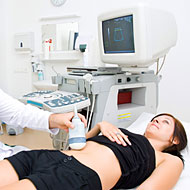- Male Infertility
- Male Infertility Symptoms
- Male Infertility Causes
- Infertility Tests
- Male Infertility Tests
- Infertility Treatment
- Male Infertility Treatment
- Female Infertility
- Female Infertility Symptoms
- Female Infertility Tests
- Female Infertility Treatment
- Premature Ovarian Failure
- Unexplained Infertility
- Acupuncture for Infertility
- Egg donation
- Sperm Donation
Causes of Infertility in Females
Infertility is defined as the inability to conceive after a year of unprotected and regular intercourse. There are many causes of female infertility which are explained in brief below. Female infertility can be a result of problems with the reproductive organs, or due to gynecological problems.
The causes of female infertility include hormonal causes, cervical causes, damaged fallopian tubes, pelvic inflammatory diseases, premature ovarian failure, endometriosis, polycystic ovarian syndrome among others. However, once the cause is determined, treatment can be started immediately. There are many instances when the causes of female infertility remain undiagnosed but even in such a situation.
Ovulation Disorders
Ovulation disorders are one of the main causes of female infertility. Anovulation or infrequent ovulation results in fewer periods which then lead to problems with fertility. This hampers the woman’s ability to become pregnant, as there are fewer opportunities to conceive. Tumors in the ovaries, adrenal glands or the pituitary glands, hyperprolactinemia, luteal phase defect, or polycystic ovarian syndrome can result in fertility problems. Other fertility disorders include resistant ovary syndrome, polycystic ovarian syndrome, primary ovarian failure, hypothalamus dysfunction, and autoimmune oophoritis.
Abnormal FSH and LH Secretion
FSH stands for follicle stimulating hormone and LH stands for luteinizing hormone. Abnormal FSH and LH secretion are also responsible for female infertility as they could result in irregular periods. FSH is partly responsible for producing eggs each month.
Polycystic Ovary Syndrome (PCOS)
Polycystic ovary syndrome (PCOS) can cause problems with the menstrual cycle and thus leads to infertility problems as well. PCOS is a common hormonal disorder which leads to anovulation, multiple cysts on the ovaries, irregular menstruation and even miscarriages.
Luteal Phase Defect
A luteal phase defect (LPD) can cause fertility problems as it can prevent implantation and cause an early miscarriage. Progesterone is released during the luteal phase. Women who suffer from LDP are unable to produce enough progesterone and this affects implantation.
Premature Ovarian Failure
Premature ovarian failure is when a woman’s ovaries stop working before she reaches 40 years of age. This means that eggs are not released regularly and normal amounts of estrogen are not being released either. This affects a woman’s fertility.
Damaged Fallopian Tube
A damaged fallopian tube is one of the most common reasons behind female infertility. A damaged fallopian tube or a blocked fallopian tube makes it difficult for the egg to pass from the ovaries into the uterus and this lead to problems with fertility.
A damaged fallopian tube could be due to previous ectopic pregnancy, surgery or pelvic inflammatory disease or even Chlamydia.
Endometriosis
Endometriosis is a painful disorder which occurs when the tissue that normally grows and lines the inside of the uterus, grows outside the uterus. This tissue then usually grows in the abdominal cavity or the pelvic region. Endometriosis is linked to infertility as it leads to scarring or adhesions in the pelvic region and can block or damage the fallopian tubes as well.
Cervical Blockage
A cervical blockage is another cause of female infertility. When this occurs the cervix is unable to produce the right type of mucus which helps with the mobility of sperm and fertilization. A cervical blockage may also mean that the opening to the cervix is closed and this will prevent sperm from reaching the egg as well. This will also lead to infertility.
Uterine Causes
There are many uterine causes linked to infertility problems. Some of these uterine causes include fibroids (growths in the muscle of the uterus), uterine polyps (small growths which occur in the uterus), and intrauterine adhesions. These growths can block the fallopian tubes and prevent implantation as well. An abnormally shaped uterus can also cause problems with conceiving and remaining pregnant.
Hormonal Disorders
Hormonal disorders are also responsible for female infertility. Ovulation is regulated by the follicle stimulating hormone (FSH) as well as the luteinizing hormone (LH). Abnormal secretions of these two hormones or irregular secretion will lead to problems with ovulation. Problems with ovulation will then of course lead to problems with conceiving and getting pregnant. PCOS and prolactin elevation are two other hormonal disorders which affect female fertility.


